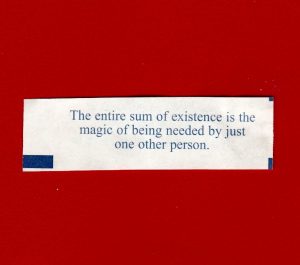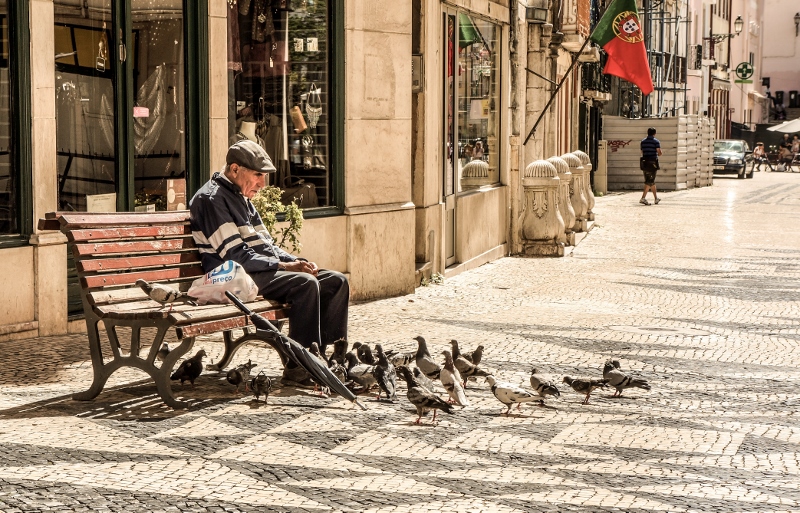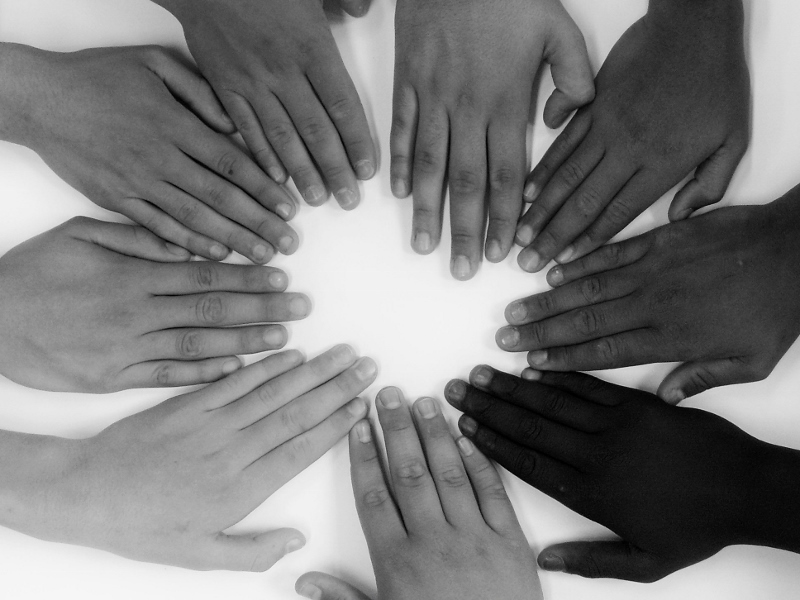Fortune Cookie Friday: ‘Cause We’re Connected

Have you ever been awed by the actions of a school of fish and how they appear to move as one? Have you ever been mesmerized by a murmuration of starlings evading a predator? Humans perform this same schooling motion in large crowds when avoiding an object. In fact, you see this very thing in action movies, when some aggressive alien or horrifying monster destroys New York City. Of course, this is only after everyone stands around gawking for 60 seconds, while you scream, “Run!”
These animals form these social groups for safety. They need each other. We form social groups for the very same reason. Why do we need each other? ‘Cause we’re connected.
When I say connected, please, please, please, don’t think that I mean connected to the Internet. Oh, the Internet is great if you want to communicate quickly over long distances or buy a pair of socks at 3 A.M., but it has been a detriment to the intimate social connection that every human needs. Actually, the World Wide Web has made us very unconnected. Therefore, it would be best if you just logged off whatever device you are looking at right now, turned to the person next to you, and said, “Hello.”
Wait! Finish reading the rest of this post first, then, do all that other stuff.
The human species is a very social creature; so social that we actually use solitary confinement as a punishment. Luckily, we aren’t as social as dogs, or we would be eagerly running up to each other saying, “Hi. You look like a nice person. You need a friend. I will be your friend. I’m going to lick you now.” Now that I think about it, maybe we should take a cue from our four-legged friends—except for that slobbering part. People are not only social we need recognition. This could be in the form of someone saying, “Hello,” to us, giving us a compliment, or picking us for a team in gym class—hopefully, not the last one picked. We need to be noticed, because it gives us purpose.

Some people desire far more recognition than required to live a happy life, but others go without enough recognition, and both instances have dire consequences. Those that feed on recognition can end up looking narcissistic. They are the type that always talks about themselves, usually boasting and bragging about something that they did, or worse taking credit for something someone else did. They put their desires and needs above those of others. This attitude can cause them to be shunned from society, and prevent them from getting the very thing that they desire.
The flip side of this are people that look for recognition by depending on being needed. These are the people that strive to help others for recognition, the ones that say they are givers, not takers. It is good if you want to help others, but anything in excess is bad. They may have discovered that taking care of another’s feelings or needs provided some vicarious satisfaction and a sense of self-worth. They might feel excessive empowerment, well-being, or even safety from caring for others. These givers become dependent on this destructive behavior. It can lead them into bad relationships, where love may not be mutual. It can also drain them of energy and resources, and leave them empty and broke. You can’t pour from an empty cup.
What about those that don’t get enough recognition? I’m sure there are people you avoid in your life; maybe not purposefully, but because they don’t matter to you. There are people that perform jobs that may seem unappealing or socially unacceptable. Have you ever thanked the people that pick up your garbage? Maybe they are people that work behind the scenes that you don’t even realize. Are you not grateful for that roll of toilet paper in the public bathroom? People can feel hurt if they don’t feel recognized for a job well done, especially one that no one else wants to do.
Yes, there are people that almost fade out of society, and this lack of need can be detrimental to their health. Recent studies have shown senior citizens to have a higher risk of illnesses and mortality because of social isolation. They are out of the workforce, and many spend time at home alone, unconnected from society. It’s easy to forget about the elderly, because they aren’t taking care of us anymore. Instead, we need to care for them, but they still need to feel needed. Researchers have also found that seniors that volunteer, especially ones trained in specific tasks, are happier and live fuller, longer lives. They feel needed, see the results of their work, and in turn, feel good. So, before you sit down after a long day and watch TV, call your grandmother.

His Holiness the 14th Dalai Lama and Arthur C. Brooks recently wrote a New York Times article about the need of being needed in society, which touches on some of these very aspects. Notwithstanding the extreme cases of being needed and recognition, people desire the “magic” of being needed. The authors wrote, “Being ‘needed’ does not entail selfish pride or unhealthy attachment to the worldly esteem of others. Rather, it consists of a natural human hunger to serve our fellow men and women.”
We are born with the need to be needed, to keep us connected as a society. Being needed gives us purpose, makes us happy, makes us healthy, and proves that each one of us has compassion for others.




